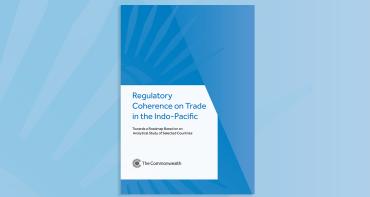"Services growth can be linked to poverty alleviation and to the Millennium Development Goals" - Ransford Smith
Commonwealth Deputy Secretary-General Ransford Smith on 19 April emphasised the "enormous" developmental potential of trade in services, a sector in which the Commonwealth Secretariat is actively supporting member countries.
"The direct contribution to economic growth, to employment creation and to poverty alleviation in developing and least-developed countries is substantial and increasing," he said.
"This sector presents many developing countries with the opportunity to diversify their economies and, thus for growth and development."
Mr Smith was speaking at the opening session of the Global Services Forum in Doha, Qatar, which took place on 19 April ahead of the 13th United Nations Conference on Trade and Development (UNCTAD).
The day-long high-level forum was jointly hosted by the Secretariat and UNCTAD. It was attended by ministers, policy-makers, trade negotiators and regulators, as well as private sector contributors, services sector stakeholders and service industries representatives.
The forum focused on how to integrate developing countries into the global services economy, which has shown more resilience over the past decade compared to trade in goods.
Emerging areas of trade in services now include the provision of key services for development, such as the provision of education, healthcare and water. It also includes traditional areas such as tourism, which Mr Smith said accounted for over half of gross domestic product (GDP) in many Commonwealth countries, particularly in the Caribbean and in the Pacific.
In his speech, the Deputy Secretary-General highlighted the significance of technological advances in both the delivery of services and in generating new services. Financial services, transport, tourism and business services all are influencing and are influenced by developments in the global economy, especially technological developments, he said.
But he stressed that "immense" challenges remained. They include regulatory challenges as well as policy challenges.
"One of the most important policy challenges is to ensure that the wider community benefits and that local populations are participants in and not bystanders to the process of services developments.
"This can be done by enhancing the competitiveness of services with which the most vulnerable segments of the population are associated, by ensuring effective linkages between dynamic services sectors and the rest of the economy," Mr Smith said.
"This will ensure that services growth and by extension, the development process itself, is inclusive. Services growth can in this way be linked to poverty alleviation and to the Millennium Development Goals."
The Commonwealth Secretariat has initiated and developed work programmes and technical assistance projects to enhance the competitiveness of member states in the services sector, such as professional services and educational services development. The Secretariat is also engaged in competitiveness assessments in Africa, Asia and the Caribbean and it works on capacity-building in services trade statistics, which help countries analyse and thereby develop strategies for services trading.
On 25 April, the Unit on Economic Cooperation Integration Among Developing Countries at UNCTAD and the Secretariat will partner for an event: 'Dynamic Developing Economies and LDCs: Integrating the South'. It will explore how least developed countries – or LDCs – can benefit from new opportunities for collaboration with emerging economies.
UNCTAD and the Secretariat have worked together for several years on promoting trade and development between emerging economies and the world's poorest countries.
Other speakers at the opening session were the President of UNCTAD XIII, Dr Hamad bin Abdulaziz Al-Kuwari, Minister of Culture, Arts and Heritage, Qatar; Dr Supachai Panitchpakdi, Secretary-General of UNCTAD; and Talal Abu-Ghazaleh, Chairman of Talal Abu-Ghazaleh Organization (TAG-Org).



